

Composting. Compost Lesson Plan 2012. School Compost Program. If you're researching how to start a school compost program, a wealth of resources are available to get you started.
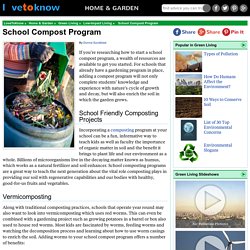
For schools that already have a gardening program in place, adding a compost program will not only complete students' knowledge and experience with nature's cycle of growth and decay, but will also enrich the soil in which the garden grows. School Friendly Composting Projects Incorporating a composting program at your school can be a fun, informative way to teach kids as well as faculty the importance of organic matter in soil and the benefit it brings to plant life and our environment as a whole. Billions of microorganisms live in the decaying matter known as humus, which works as a natural fertilizer and soil enhancer. School composting programs are a great way to teach the next generation about the vital role composting plays in providing our soil with regenerative capabilities and our bodies with healthy, good-for-us fruits and vegetables.
Vermicomposting. Life Lab » Composting Lesson Resources and Videos. School Composting – Green Action Centre. Students learn about caring for the environment in different ways and what better way to understand what happens to our garbage than through the hands-on experience of composting!
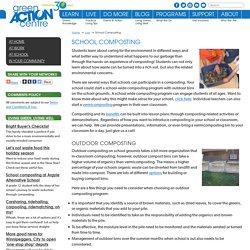
Students can not only learn about how waste can be turned into a rich soil, but also the related environmental concerns. There are several ways that schools can participate in a composting. Your school could start a school-wide composting program with outdoor bins on the school grounds. A school wide composting program can engage students of all ages. Want to know more about why this might make sense for your school, click here. Composting and its benefits can be built into lesson plans through composting-related activities or demonstrations. Outdoor composting on school grounds takes a bit more organization that in-classroom composting; however, outdoor compost bins can take a higher volume of organics than vermicomposting.
It may sound like a lot of work, but remember that the whole school can be involved. Guide to Staring a School Compost Program. Compostingintheclassroom. ES MS Classroom Composting. How to Make Compost. By Bryan Brown Compost is constantly being created by nature.
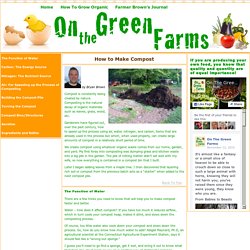
Composting is the natural decay of organic materials such as leaves, grass, wood, etc. Gardeners have figured out, over the past century, how to speed up the process using air, water, nitrogen, and carbon, items that are already used in the process but which, when used properly, can create large amounts of compost in a relatively short period of time. We create compost using whatever organic waste comes from our home, garden, and yard. My first foray into composting was dumping grass and kitchen waste into a big pile in the garden. Later I began adding leaves from a maple tree. Back To Top The Function of Water There are a few tricks you need to know that will help you to make compost faster and better. Water – how does it affect compost? Of course, too little water also cools down your compost and slows down the process. I guess you’ll need to go find a sponge, get it wet, and wring it out to know what that feels like. Aeration.
How to make a compost heap: 10 top tips- Eden Project, Cornwall. For anyone new to composting, or those who simply want to improve their existing compost heaps, we’ve prepared a round-up of top tips and great stuff that will help you get on top of your compost. 1.
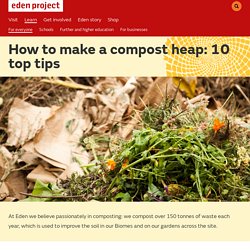
Buy a decent compost bin If you don’t fancy building a compost heap like the large ones we have at Eden, try a compost bin. They’re compact, so they’re perfect for smaller gardens and yards. We've lots in our online shop. 2. It’s best to site it on a level, well-drained spot, which will ensure that any excess water drains away easily. 3. Nature has provided us with the perfect waste disposal unit in the humble worm. 4. Good things to compost include vegetable peelings, fruit waste, teabags, plant prunings and grass cuttings. 5. Certain things should never be placed in your bin. 18 Cool DIY Compost Bin Designs. Building your own DIY composter is an easy way to save money on garden supplies and keep materials out of the landfill.
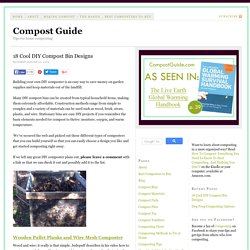
Many DIY compost bins can be created from typical household items, making them extremely affordable. Construction methods range from simple to complex and a variety of materials can be used such as wood, brick, straw, plastic, and wire. Stationary bins are easy DIY projects if you remember the basic elements needed for compost to thrive: moisture, oxygen, and warm temperature. We’ve scoured the web and picked out these different types of composters that you can build yourself so that you can easily choose a design you like and get started composting right away. If we left any great DIY composter plans out, please leave a comment with a link so that we can check it out and possibly add it to the list. Wooden Pallet Planks and Wire Mesh Composter Wood and wire: it really is that simple.
How to Build a Compost Bin.